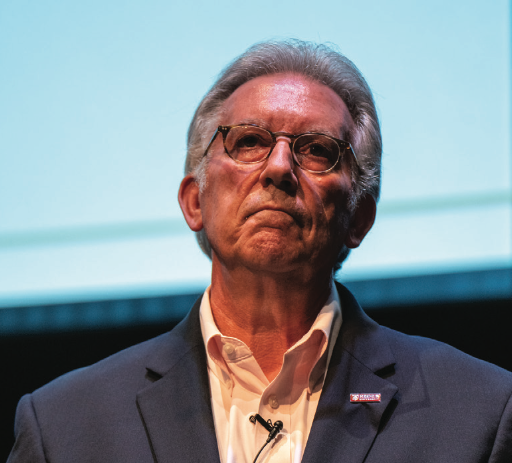
SGA holds town hall with university leaders
By Shaun Chornobroff
Top university administrators, including Rider President Gregory Dell’Omo and Provost DonnaJean Fredeen among other higher-ups, touched on various topics concerning the student body in an open forum on Nov. 3.
The event, titled “Let’s Talk Rider” and hosted by Rider’s Student Government Association (SGA), included presentations and discussions about multiple topics prevalent to the student body, such as the university’s transition to ADP for its payroll, deregistration and the overall state of Rider.
“With the immense amount of change over last semester and the summer, we felt it was ever so important to be having this conversation as soon as possible,” said SGA President Andrew Bernstein.
A better system
Rider’s Director of Procurement and Project Management Ann Marie Mead explained that the university’s transition to ADP started more than a year ago.
The goal was to find a system that was more effective for the university community; however, faculty and students have had difficulties adjusting to the new system.
One of the most prevalent issues revolved around students who have more than one on-campus job, since ADP only allows one supervisor to sign off on timesheets at a time.
“That is a broad issue, and that’s just the way they built it,” Mead said. “Unfortunately that rule applies to Rider, where only one person, initially the primary supervisor, is the one who can sign it.”
During her speech, Mead said there were approximately 150 students working multiple on-campus jobs “the last time [she] checked.”
The university recently created an email for payroll issues, studentpayroll@rider.edu, and has employees dedicated to helping students get help in instances of issues with compensation.
Deregistration is a step for success
Rider’s deregistration policy has also been a consistent source of discussion.
First put into place last fall, the new policy has removed a number of students with outstanding balances from classes; however, Drew Aromando, Rider’s vice president of enrollment management, alongside the university’s Executive Director of One Stop Services James Conlon, explained this policy was meant to help students.
“The mission of deregistration is not to put the brakes on people’s path to success, it’s actually to help them become more successful,” said Aromando, who said Rider looked at what schools similar to it did before making a decision.
Among the concerns raised by the student body during this portion of the discussion was the fear of losing access to Rider’s resources due to deregistration, specifically the university’s counseling center.
Throughout their presentations, Aromando and Conlon mentioned they send emails and text messages and have called students to try and help them pay their bills. They both emphasized that the university wants to help students, not abandon them.
“We don’t cut them off of anything; all we are doing is removing them from the courses. That’s it,” Aromando said.
‘What we’re trying to do is get healthy’
In their presentation, Fredeen and Dell’Omo emphasized that the transition process the university is going through is ongoing, and decisions are made through constant evaluation of the state of the school.
When the floor was opened to questions, many revolved around Westminster Choir College, which was relocated from a separate Princeton campus to Lawrenceville in 2020. Westminster students opened up about not feeling heard as members of the Rider community and asked what the vision is for the future of the choir college.
“What we are trying to do is get the message out there that Westminster is still here, Westminster is still performing,” Fredeen said, noting the difficulty the pandemic has caused in recruiting prospective students.
As the university transitions, Dell’Omo emphasized that he is attempting to formulate an institution that is functional in all facets.
“You have to not only have the resources to not only run the academic side, but all those support areas that make the academics worthwhile,” Dell’Omo said. “So that’s really what we’re trying to do is get healthy, so we don’t have to shortchange what areas to pay for.”


